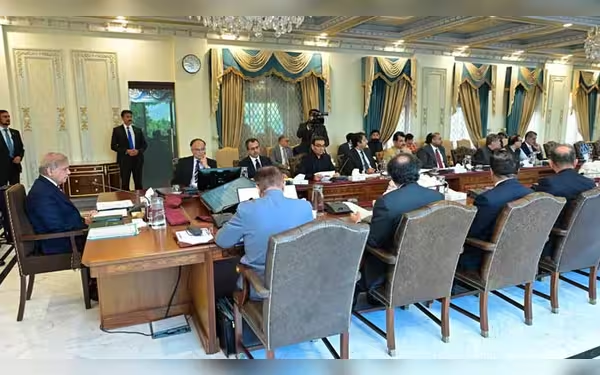Saturday, November 16, 2024 05:37 PM
Cabinet Committee Approves Independent Electricity Market in Pakistan
- Independent System and Market Operator to enhance competition.
- Consumers can choose suppliers beyond traditional companies.
- Reforms aim to reduce electricity tariffs and circular debt.
 Image Credits: geo
Image Credits: geoPakistan's Cabinet Committee on Energy approves an independent electricity market to enhance competition and reduce tariffs.
In a significant move aimed at reforming Pakistan's power sector, the Cabinet Committee on Energy (CCoE) has approved the establishment of an independent multiplayer market for electricity generation and purchase. This decision, made during a meeting chaired by Prime Minister Shehbaz Sharif, seeks to foster a competitive environment and gradually diminish the government's role as the sole purchaser of electricity.
The proposed Independent System and Market Operator (ISMO) is set to play a crucial role in this transformation. Once endorsed by the federal cabinet and registered with the Securities and Exchange Commission of Pakistan under the Companies Act 2017, the ISMO will facilitate a more transparent and competitive electricity market. According to a statement from the Prime Minister’s Office (PMO), “The ISMO is aimed at gradually decreasing the government’s role as a sole buyer of electricity and turning the electricity market into a multiplayer independent, transparent and competitive market.”
One of the key benefits of the ISMO is that it will empower consumers to purchase electricity from suppliers other than traditional power distribution companies. This shift is expected to lead to long-term planning for producing low-cost electricity and improving its transmission, ultimately reducing power prices and addressing the issue of circular debt.
During the meeting, participants were briefed on the ongoing challenges posed by circular debt in the power sector. Prime Minister Shehbaz emphasized the need for priority measures to reform the sector, urging for accelerated actions to combat power theft and losses. He also called for disciplinary actions against employees of distribution companies involved in such thefts. Furthermore, the Prime Minister directed authorities to leverage modern technology to implement reforms and curb power theft effectively.
The high cost of electricity has become a pressing political issue in Pakistan. Opposition parties have been quick to capitalize on public dissatisfaction, criticizing the government’s management of the energy sector and its agreements with independent power producers (IPPs). The burden of soaring electricity tariffs disproportionately affects middle and lower-income families, leading to public outrage and diminishing trust in the government’s economic management.
Experts believe that successful renegotiations with both local and international IPPs could significantly lower tariffs, enhance industrial competitiveness, and restore public confidence in the government's ability to manage the economy effectively. Conversely, a failure in these negotiations could lead to even higher tariffs, placing additional financial strain on both the government and consumers, potentially crippling industries and inciting public unrest.
The establishment of the ISMO represents a pivotal step towards a more competitive and transparent electricity market in Pakistan. While the road ahead is fraught with challenges, the potential benefits of reduced tariffs and improved service delivery could significantly enhance the quality of life for many citizens. As the government moves forward with these reforms, it is crucial for all stakeholders to remain engaged and committed to ensuring a sustainable and equitable energy future for the country.













